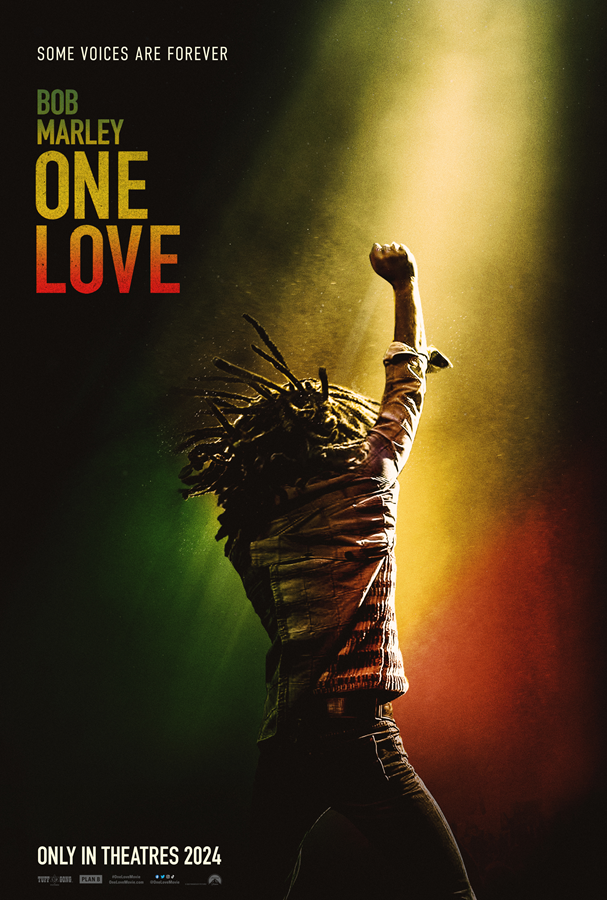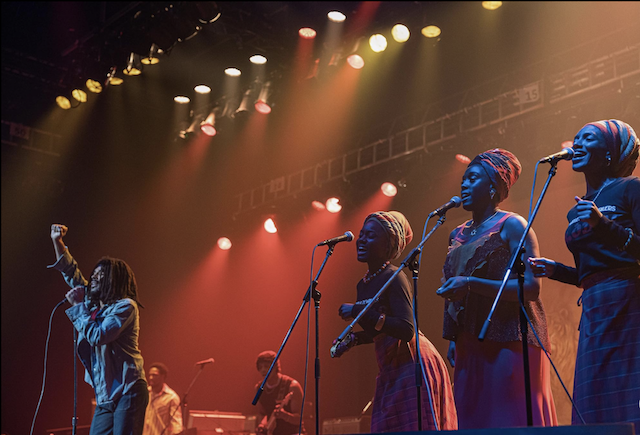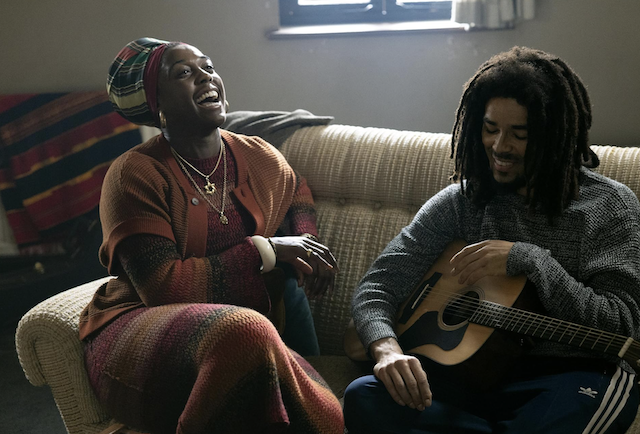
©Courtesy of Paramount Pictures
My brother once told me about a guy he met at a party who was staring at a poster of Jimi Hendrix. When someone asked him why he was transfixed with the poster, the man replied, “Who is that?” Now, keep in mind, this was back in the late 90s. Accessible internet on dial-up for the world was still a new concept. This always bothered me. Even if Jimi isn’t your thing and maybe you never knew what he looked like, everyone knows his name, right? This fella claimed to have never heard of him.
Now that social media and the internet as a whole has taken over our culture, the pool of general knowledge (especially when it comes to celebrity) is so vast. I can understand if I come across someone who doesn’t know a thing about Jimi Hendrix. That being said, I think the name Bob Marley still hits a note with anyone and everyone with a working conscience. Still, there is a lot about Marley that people may not know. But, does the new biopic Bob Marley: One Love do enough to bring justice to Marley’s legacy?
Bob Marley: One Love chooses to focus on the last few years of Marley’s life, instead of telling a start to finish story. The film kicks off at the time Marley tried to unite the warring factions of Jamaica with a free concert. It documents the events right before the show to Marley’s need to leave Jamaica after the show. How he aimed to improve on his musical legacy and what it could mean for the world.
It’s a good jumping off point for the film. While we get flashbacks to his childhood and teen years that show how they shaped him, it is a preferable road to the traditional biopic formula. It’s not a revolutionary evolution in storytelling. All the pieces fit nicely together and feel genuine. The pace is good and performances kick off just right. Then Bob decides to leave Jamaica and the tried and true biopic formula kicks in. In a tight and reasonable 104 minutes, Bob Marley: One Love treads some all too familiar presentation whilst peppering in a few good ideas that never properly develop.
 Photo by Chiabella James/Chiabella James – © 2023 Paramount Pictures. All Rights Reserved.
Photo by Chiabella James/Chiabella James – © 2023 Paramount Pictures. All Rights Reserved.
Once he is in London, viewers are treated to the most cookie cutter exploration of the life of a musician. “Let’s show Bob trying to learn from his surroundings.” “Now show Bob coming up with the name for his new album.” “Oh, show how Bob came up with a way to change his sound.” “It’s time to show Bob releasing and touring his biggest hit ever.” “can we show Bob being enticed by his fame growing even bigger?” “Don’t forget to show some rifts and how they heal.”
It’s technically his life, and how the lives of other musicians go. But there has to be a better way to show these events than what has been done so many times before. The best thing the film does though is show you some of Bob’s true influences in a breadcrumb like fashion. Yet, if you aren’t aware of what these influences are, you might be completely lost on what the film is showing you. During a scene on their tour bus while in France, you can see Bob reading a book about Haile Selassie. It might have been Selassie’s autobiography or a book about him. That part was hard to tell.
This works as a clever reference to the once Emperor of Ethiopia who Marley idolized. But later in the film, Marley starts to implant visions of Selassie to replace that of the memory his father. His father was a white British colonizer. Bob imagines himself running from the terrifying figure of his non-existent father through a burning wheat field. Later, that scene of horror and fear turns to one of glory and passion. Selassie now takes the place of the colonizer and becomes the liberator. But it is ill explained in terms of cinematic story telling. You need to know these facts for these scenes to fully make sense.

Photo by Chiabella James/Chiabella James – © 2023 Paramount Pictures. All Rights Reserved.
The other positive it has over most biopics is that Kingsley Ben-Adir does what any actor should do when portraying a real life person. He puts on a performance as an actual character does not besmirching the subject legacy. He’s not just putting on an imitation accent. As a very white, non-Jamaican, I feel that the British actor had a convincing accent that not only didn’t ape on Marley’s actual voice…it didn’t feel like a thick joke on what popular culture wants to make everyone think all Jamaicans sound like.
The Marley brand of Tuff Gong was involved with the film and gave full permission to use the man’s music, there is plenty of Marley tuned throughout the film. Though, in some weird twist, it feels like the movie would have been better off only using his actual music when they were being performed and using other music as accent points. No big deal, but it somehow would have felt more powerful to only hear those songs as performances. Especially since the sound mixing for the live performances here are absolutely brilliant! It feels like you’re 100% at an actual concert. And that bass!!! WHOOOOO!
As much as the traditional story structure was something that needed to be moved away from, the parts it should have focused more on were left as afterthoughts. It is well known that Bob and Rita Marley had plenty of martial issues. Infidelity was revealed to be a big issue. And I get that a film supported by the family would want to veer away from this. But the hints they drop are so fleeting, it actually feels insulting. Match that with how much it plays on Bob’s life being all about his relationship with Rita, it can make things very uneven.
Final Grade: B-
Check out more of Matthew’s articles.
Here’s the trailer of the film.

